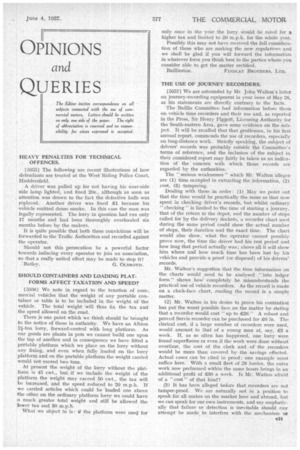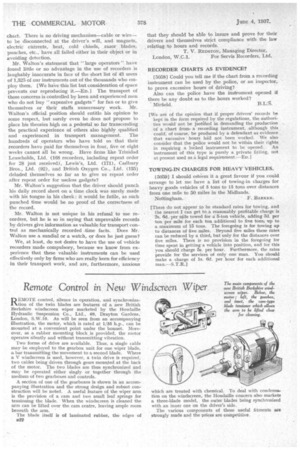OPINIONS
Page 55

Page 56

If you've noticed an error in this article please click here to report it so we can fix it.
and
QUERIES
HEAVY PENALTIES FOR TECHNICAL • OFFENCES.
[50551 The following are recent illustrations of how defendants are treated at the West Riding Police Court, Huddersfie]d.
A driver was pulled up for not having his near-side side lamp lighted, and fined 20s., although as soon as attention was drawn to the fact the defective bulb was replaced. Another driver was fined £1 because his vehicle emitted dense smoke. In this case the man was legally represented. The lorry in question had run only 17 months and had been thoroughly overhauled six months before by the makers.
It is quite possible that both these convictions will be forwarded to the Traffic Authorities and recorded against the operator.
Should not this persecution be a powerful factor towards inducing every operator to join an association, so that a really united effort may be made to stop it?
'Bailey. G. OLDROYD.
SHOULD CONTAINERS AND LOADING PLATFORMS AFFECT TAXATION AND SPEED?
[5056] We note in regard to the -taxation of coin-• mercial vehicles that the weight of any portable container or table is to be included in the weight of the vehicle. The total weight will thus fix the tax and the speed allowed on the road.
There s one point which we think should be brought to the notice of those in authority. We have an Albion 21-ton lorry, forward-control with long platform. As our goods are plants in pots we cannot build one upon the top of another and in consequence we have fitted a portable platform which we place on the lorry, without any fixing, and even when fully loaded on the lorry platform and on the portable platform the weight carried would not exceed two tons.
At present the weight of the lorry without the platform is 45 cwt., but if we include the weight of the platform the weight may exceed 50 cwt., the tax will be increased, and the speed reduced to 20 m.p.h. If we carried articles which could be loaded one above the other on the ordinary platform lorry we could have a much greater total weight and still be allowed the lower tax and 30 m.p.h.
What we object to is if the platform were used for only once in the year the lorry Would be rated for a higher tax and limited to 20 m.p.h. for the whole year.
Possibly this may not have received the full consideration of those who are making the new regulations and we shall be glad if you will forward the information in whatever form you think best to the parties whom you consider able to get the matter rectified.
Baillieston. FINDLAY BROTHERS, LTD, THE USE OF JOURNEY RECORDERS.
[5057] We are astounded by Mr. John Walton's letter on journey-recording equipment in your issue of May 28, as his statements are directly contrary to the facts.
The Baillie Committee had information before them on vehicle time recorders and their use and, as reported in the Press, 8ir Henry Piggott, Licensing Authority for the South-eastern Area, gave some evidence on the subject. It will be recalled that that gentleman, in his first annual report, commends the use of recorders, especially on long-distance work. Strictly speaking, the subject of drivers' records was probably outside the Committee's terms of reference, and the inclusion of the subject in their considered report may fairly be taken as an indication of the concern with which those records are regarded by the authorities. • The " serious weaknesses" which Mr. Walton alleges are (1) time occupied in extracting the information, (2) cost, (3) tampering.
Dealing with those in order : (1) May we point out that the time would be practically the same as that now spent in checking driver's records, but whilst ordinary " checking " is limited to the time of starting a journey, that of the return to the depot, and the number of stops called for by the delivery dockets, a recorder chart used during the same period could show the actual number of stops, their duration and the exact time. The chart would also show, what the operator cannot possibly prove now, the time the driver had his rest period and how long that period actually was; above all it will show him where and how much time has been lost by his vehicles and provide a proof (or disproof) of his drivers' records.
Mr. Walton's suggestion that the time information on the charts would need to be analysed "into ledger form" shows how completely he misunderstands the practical use of vehicle recorders. As the record is made on a clock-face chart, reading the record is .a simple matter.
(2) Mr. Walton in his desire to prove his contention has put the worst possible face on the matter by stating that a recorder would cost "up to £20." A robust and proved Servis recorder can be purchased for £6 Ss. The clerical cost, if a large number of recorders were used, would amount to that of a young man at, say, £3 a week. If, as so often has happened, one lorry were found superfluous or even if the work were done without overtime, the cost of the clerk and of the recorders would be more than covered by the savings effected. Actual cases can be cited in proof : one example must suffice here. With a small fleet of 28 lorries, the extra work now performed within the same hours brings in an additional profit of £30 a week. Is Mr. Walton afraid of a " cost " of that kind?
(3) It has been alleged before that recorders are not tamper-proof. We are naturally not in a position to speak for all makes on the market here and abroad, but we can speak for our own instruments, and say emphatically that failure or detection is inevitable should any attempt be made to interfere with the mechanism or
chart. There is no driving mechanism—cable or wire— to be disconnected at the driver's will, and magnets, electric currents, heat, cold chisels, razor blades, punches, etc., have all failed either in their object or in avoiding detection.
Mr. Walton's statement that "large operators" have found little or no advantage in the use of recorders is laughably inaccurate in face of the short list of 43 users of 1,325 of our instruments out of the thousands who employ them. [We have this list but consideration of space prevents our reproducing The transport of those concerns is controlled by keen and experienced men who do not buy "expensive gadgets" for fun or to give themselves or their staffs unnecessary work. Mr. Walton's official. position should entitle his opinion to some respect, but surely even he does not propose to place his theories high on a pedestal so far transcending the practical experience of others also highly qualified and experienced in transport management. The hundreds of operators who have told us that their recorders have paid for themselves in four, five or eight weeks cannot all be wrong. Have firms like Trinidad Leaseholds, Ltd. (168 recorders, including repeat order for 28 just received), Lewis's, Ltd. (171), Cadbury Bros., Ltd. (92), and British Oxygen Co., Ltd. (135) deluded themselves so far as to give us repeat order after repeat order for useless gadgets?
Mr. Walton's suggestion that the driver should punch his daily record sheet on a time clock was surely made with his tongue in his cheek : it would be futile, as such punched time would be no proof of the correctness of the record.
Mr. Walton is not unique in his refusal to use recorders, but he is so in saying that unprovable records by drivers give information as valuable for transport control as mechanically recorded time facts. Does Mr. Walton use a sundial or a watch, or does he just guess?
We, at least, do not desire to have the use of vehicle recorders made compulsory, because we know from ex perience that these valuable instruments can be used effectively only by firms who are really keen for efficiency in their transport work, and are, furthermore, anxious that they should be able to insure and prove for their drivers and themselves strict compliance with the law relating to hours and records. T. V. REDSTON, Managing Director, London, W.C.1. For Servis Recorders, Ltd.
RECORDER CHARTS AS EVIDENCE?
(50581 Could you tell me if the chart from a recording instrument can be used by the police, or an inspector, ' to prove excessive hours of driving?
Also can the police have the instrument opened if there be any doubt as to the hours worked?
Mirfield.
[We are of the opinion that if proper drivers' records he kept in the form required by the regulations, the authorities would not be justified in demanding the production of a chart from. a recording instrument, although this could, of course, be produced by a defendant as evidence that exCessive hours had not been worked. We also consider that the police would not be within their rights in requiring a locked instrument to be opened. An instrument of this type is purely a private fitting, not at present used as a legal requirement. —ED.]
TOWING-IN CHARGES FOR HEAVY VEHICLES.
[5050] I should esteem it a great favour if you could arrange to let me have a list of towing-in charges for heavy goods vehicles of 5 tons to 15 tons over distances from one mile to 50 miles in the Midlands.
Nottingham. F. BA RKER
[There do not appear to be standard rates for towing, and the nearest I can get to a reasonably profitable charge is 2s. fid.•per rdile towed for a 5-ton vehicle, adding ad. per ton per mile for each ton additional to five tons, up to a maximum of 15 tons. The foregoing is for towing up to distances of five miles. Beyond five miles these rates can be reduced by a third, but only for the distances over five miles. There is no provision in the foregoing for time spent in getting a vehicle into position, and for this you should charge 5s. per hour. Furthermore, the rates provide for the services of only one man. You should make a charge of Is. Gd. per hour for each additional man.--S.T.R.]




























































































